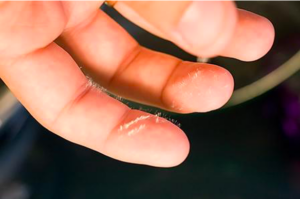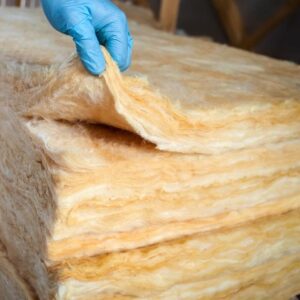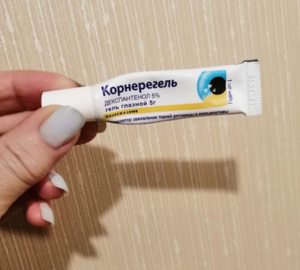Glass wool gets on your skin and eyes: what to do, how to remove it, burns, harm and danger
There is only one reliable way to remove glass wool from the skin - take a cold shower and thoroughly rinse the affected area with plenty of water. At the same time, you should absolutely not touch it, much less comb it, use soap, a washcloth, or even a soft sponge. First aid measures in different cases are described in detail in the presented article.
The content of the article
Why is glass wool dangerous?
It is important to understand why glass wool is dangerous in order to prevent it from coming into contact with the skin and especially the eyes. The main disadvantages of this artificial material come down to 2 points:
- Fibers can break down into thousands of small particles, including those invisible to the eye. These particles are dangerous in any contact, including with the skin, mucous membranes of the eyes, throat, nose, especially if ingested. They cause irritation, inflammation and allergic reactions.
- The health hazards of glass wool are also associated with the presence of phenols and formaldehyde in the composition. These substances are often (though not always) used in production because they are a binding component. Both compounds are poisonous, so if they enter the stomach, even in small quantities, they can lead to poisoning.

Therefore, you need to understand how to get rid of glass wool and avoid contact with skin at all.To do this, it is advisable to work with thick gloves, use a mask and goggles.
At the same time, experts note that modern glass wool is much safer, since it is an elastic, soft material that does not break down into small particles. Therefore, in practice, most builders neglect safety precautions. But if you have no experience, it is better to follow all the rules described, and they are also quite simple.

If glass wool gets on your skin
If the material comes into contact with the skin, it is not as dangerous as if glass gets into the eye. But you need to know how to act correctly so as not to aggravate the situation. To do this, it is recommended to follow these tips:
- First of all, you should not itch or smear particles over the surface. Despite the fact that upon contact there is severe itching, it is better to be patient. Otherwise, small particles will penetrate directly under the skin - this is the main danger of glass wool.
- You must immediately take off your clothes and take a cool shower (the water should be as cold as possible), and under strong pressure. It is recommended to simply stand under it without using soap, especially a washcloth, sponge, etc. without any contact with the skin.
- It is important to understand that it is a cold shower that helps with glass wool. If you turn on hot water, the skin pores will expand, and then particles will inevitably enter them.
- After the shower is over, you can’t dry yourself either - you need to wait until the water has completely evaporated naturally.
- To minimize the damage to glass wool, after drying, take another shower, also with cold water. This time you can use soap. But it is better to rub the foam not with a washcloth, but with a soft sponge. If it’s not there, just use your hands.
- To avoid getting burned by glass wool, it is better not to use clothing that has come into contact with this building material. It is very difficult to wash it off - individual particles will still remain, so it is better not to risk it.
- But if you feel sorry for your clothes, you can first vacuum them thoroughly and then wash them several times separately from other things. Moreover, it is advisable to do this manually first (for example, 3 times), and then in a washing machine (2 times). After the clothes are completely dry, they are vacuumed again at maximum power. If this doesn't help, you can try dry cleaning.

If glass wool gets into your eyes
When glass wool gets into your eye, you must immediately stop working and proceed as follows:
- Do not rub your eyes with your hands or contact them at all.
- Rinse immediately with plenty of running water. It is best to use a shower that provides moderate pressure. If this is not possible, you can rinse by hand or make an eye cup (a small container filled with water). You can also put a hose on the faucet and direct the stream directly into the eye, while providing medium pressure.

- It’s useful to know what to do if glass wool gets into your eye, and also what you definitely shouldn’t do. You should absolutely not use detergents or rub your eyes with your fingers until the symptoms are completely eliminated.
- If your eyes start to turn red, you should drop Tsipromed drops or use gels (Solcoseryl, Korneregel).
- If symptoms of irritation, redness and inflammation do not go away within a few hours, consult a doctor. It is clear why glass wool is harmful - it contains toxic substances and small particles that can simply scratch the eye and lead to partial death of cells.

If cotton wool gets into the mouth, respiratory organs, stomach
It is necessary to figure out what to do if glass wool gets into your eyes, as well as other mucous membranes. Often it gets into the mouth - then you should immediately take the following actions:
- Rinse your mouth with plenty of clean water, avoiding swallowing it (do not throw your head back, stand at an angle to immediately spit out the liquid).
- After several such cycles, drink 1-2 glasses of water.
- Then do not take water or food for 20-30 minutes.
- Carefully monitor your health, and if it worsens, consult a doctor.
If glass wool fragments are accidentally inhaled, the first sign will be a persistent, severe cough, which may even cause a headache. It is impossible to cure this at home, and waiting until the cough goes away on its own is risky. Therefore, you should consult a doctor, especially in cases where you have breathing problems.
The same should be done in cases where cotton wool accidentally gets into the stomach. It is clear that you can both relieve the itching from glass wool and wash yourself in the shower without outside help. But if the material gets into the internal organs, it is better to immediately call an ambulance.
Now it’s clear why you shouldn’t touch glass wool, and what the dangers of this building material are. Modern compositions are more elastic and practically do not crumble, but this possibility cannot be completely excluded. Therefore, you should work very carefully, using protective equipment, and if an emergency occurs, immediately provide first aid.





